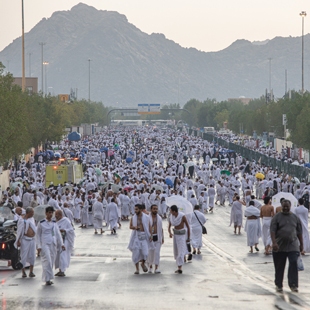The Day of Arafah falls on the 9th day of Dhu al-Hijjah, the second day of Hajj, and is considered the holiest day of the Islamic year. On this day, the pilgrims go to Arafat, which is where the prophet Muhammad gave one of his final sermons. Mount Arafat is known as the Mountain of Mercy, and this day of hajj is known as a day of prayer, repentance, and God’s acceptance of prayers. Known as the key to the pilgrimage, pilgrims spend the afternoon on the plain or Mount of Arafat in worship, seeking God’s mercy and asking for forgiveness.
To Name this Day:
 Video
Video
Habib Muhammad Abdul-Rahman al-Saqqaf reflects on the Prophet’s counsel in The Farewell Sermon.
 Spiritual Practices
Spiritual Practices
While it is not recommended for those who are performing their hajj to fast, for those Muslims who are not on the pilgrimage, fasting on the Day of Arafah is highly recommended; doing so is said to expiate the sins of the preceding year and the coming year.
Try repeatedly offering this Day of Arafah dua (prayer):
None has the right to be worshipped except Allah, alone, without partner. To Him belongs sovereignty and all praise and He is over all things omnipotent.
laa ilaaha ill-allaahu, waḥdahu laa shareeka lah, lahul-mulku wa lahul-ḥamdu, wa huwa ‛alaa kulli shay’in qadeer
Recite the following as much as possible:
subhanallah (Glory to God)
alhamdulillah (Praise to God)
laa illaha illallah (there is no god but God)
Allahu akbar (God is greatest)
Offer the special supplications from The Best Day of the Year: The Day of Arafah.
Read Dua 'Arafah of Imam al-Husayn on the Day of Arafat and contemplate its deep teachings throughout the year.
